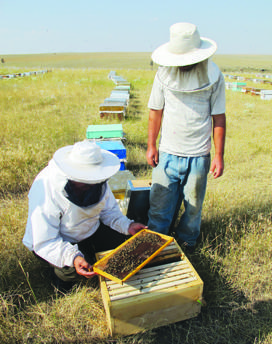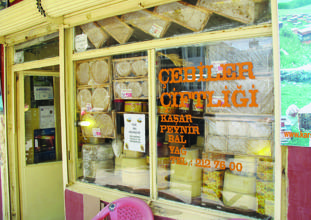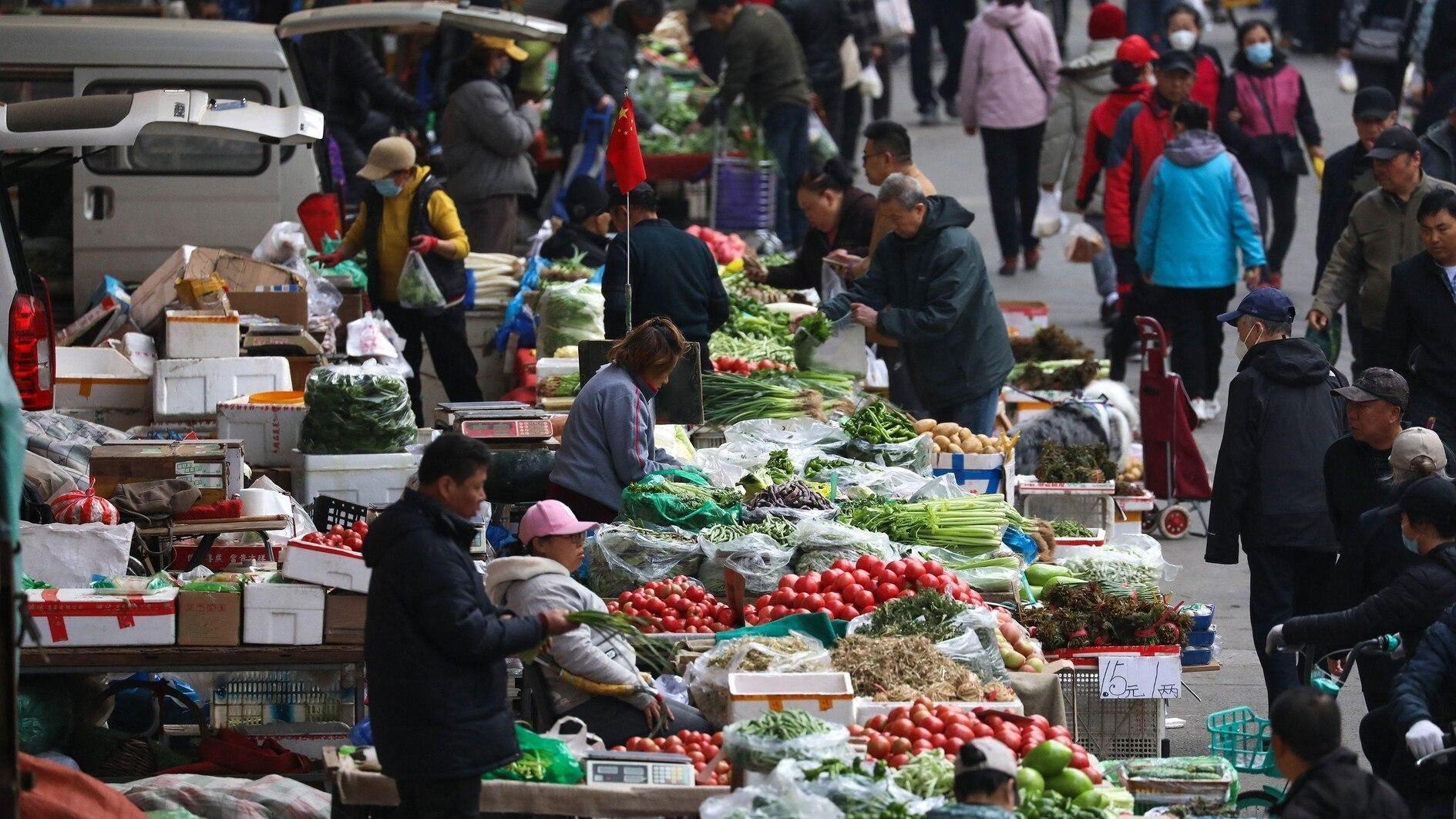Land of Kars flows with liquid gold: Honey
Wilco van Herpen

Photos by Wilco van Herpen.
About 25 kilometers away from the eastern province of Kars, on the vast planes of this province I see a small barrack. A narrow dirt road leads to the little barrack but it takes me 20 minutes to reach it. Big boulders that make it hard for a normal car to pass obstruct the road. All around me is a vast, slightly greenish but mainly yellow dry plain. The trembling heat of the sun makes the plain dance in front of my eyes.In front of the shanty 3 guys are walking around beehives. There must be more than 300 of them. One of the men is completely covered in a protective suit; the other just covered his head with a hat that protects him from being stung by bees. It is the end of august, slowly there are no flowers left for the bees to get their nectar. For people this is a dangerous time to approach beehives. Whenever bees can find food (nectar) in abundance you do not have to be scared; the bees become more aggressive once they cannot find nectar anymore. For no reason whatsoever they might attack you and if you are allergic to the sting of a bee the only remedy is to go a hospital as fast as possible where the doctors can treat you.
 Meeting aliens
Meeting aliens Approaching me with their protective cloth it is as if I am going to meet aliens. The weird white hat with netting in front of the eyes is connected to the body. This makes it impossible for the bees to sting the beekeeper. One of the beekeepers just wears a hat but no protective cloth for his arms or body. It seems a bit odd to me, they can sting your arms or even through your t-shirt but it does not seem to worry this man. Ahmet, Hasan and Ali welcome me warmly. I directly fire my first question upon the guy without complete protective cloth. “Why do you not cover yourself completely, are you not scared of being stung by the bees?” I ask him. His answer is simple: “I am not scared of being stung. The only thing that happens is that I feel a little pinch and that is all. I am not allergic but do want to cover my head because it is not really pleasant if a bee flies into your mouth and stings you there. That’s why I just wear a hat. I got so much used to the bee sting that my body does not react to it anymore”.
Behind the beekeepers is a little barrack. It is nothing more than four walls made of board with a roof on it. From a distance the place looks like a little playhouse but this the place where the three men spend four months. It provides shelter during blizzards that suddenly can occur on the vast plains of Kars. At the same time this is their kitchen and a place to sleep.
Ali, living in the Black Eastern province of Ordu, left his family to be a beekeeper in Kars. This is the place where his father was a beekeeper as well so for him, in order to earn a living, it was an easy decision to make when his friend asked him to come over and help him with the honey production. There is no water, no toilet and no electricity in the shack. Noticing the lack of comfort I immediately start looking at honey with different eyes. This is a really back to basic; hardcore basic. I wonder what the people would think if they knew about this. My guess is that they suddenly would appreciate the taste of honey more than they ever did before. In order to make a phone call they have to walk to a certain spot where their mobile will get the signal from a village that I cannot see from this point.
Ali, who introduced me to the three beekeepers, is the man who buys the honey from those beekeepers. Selling honey Ali, asks 40 Turkish Liras per kilo. If the guys are lucky they get 50 kilo honey out of one beehive but generally one beehive gives the beekeeper just 15 or 20 kilos. In the best case, but this is more a fairy tale then reality, the beekeepers would be able to give Ali, the honey seller, 15,000 kilos but on average they collect about 6,000 kilograms of honey. That makes 240,000 Turkish Liras (for Ali…) I did not dare to ask how much the beekeepers get per kilo but I cannot imagine it is a lot of money.
 Fake honey
Fake honey Together with Ali I return to Kars. In his shop Ali explains a bit more about honey and beekeeping. “The biggest problem for us is the fake honey. People collect honey, mix it with glucose or other stuff and sell it as pure honey or even organic honey. But the price they ask for it is ridiculously low. They want 20 Turkish liras per kilo. I tell you, it is impossible to sell real organic honey for less than 40 liras per kilo. Sometimes the beekeepers ‘feed’ their bees. They give them sugar that the bee transforms into honey. People who add sugar can get as much as five times more honey from one beehive compared to the people who do not feed their bees. That’s why I always work with the same people. I know I can trust them and so I know that my customers will be satisfied. The biggest problem for me is that it is very difficult to show the customer the difference between “real” honey and honey that has been mixed with alternative sugar or syrup.
There are a couple of things the buyer can look at: dip a spoon in the honey and keep it above the jar. Real honey slowly will “stream” from the spoon into the jar. No drops but a thin “thread” of honey. At the end the thread will “break” and the honey will “climb” up back to the spoon, become a big tear of gold and then, when it collected enough honey, eventually fall in the jar. Imitation honey will drip constantly; there is no beautiful golden thread. When honey gets older it will “crystallize.” That does not mean that the honey is of a bad quality, on the contrary. But good honey crystallizes equally in the jar. Bad honey starts crystallizing from the bottom.
According to Ali, business is going very well in Kars. Being the youngest honey and cheese salesman of Kars he started Karsak one year ago. Nowadays there are more than 60 cheese and honey shops. The two go perfect together because the cows that are grazing on the vast planes of Kars are eating different herbs and plants while the bees take their nectar from the plants and herbs.
















